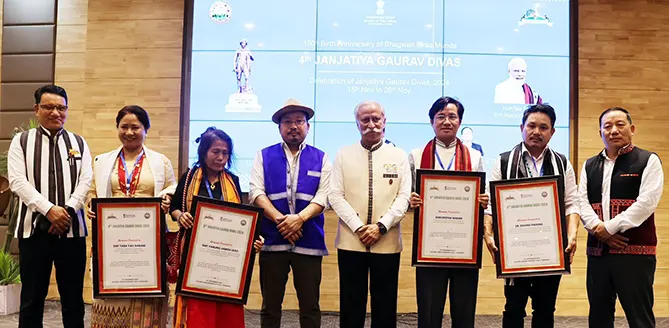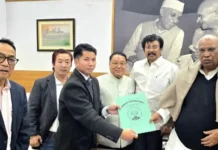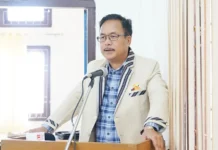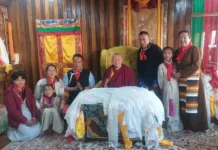Staff Reporter
ITANAGAR, 15 Nov: Governor K.T Parnaik stated that tribal involvement in nation-building is most effective when there is mutual respect and recognition of their rights, culture, and self-governance. Governor Parnaik was addressing the people while participating in the 4th Janjatiya Gaurav Diwas celebration at the Golden Jubilee Banquet Hall here on Friday.
The Governor paid floral tributes to Bhagwan Birsa Munda and extended warm greetings to all citizens. He emphasized that Birsa Munda was not only a tribal leader but also a national hero whose efforts during the British colonial era inspired many. Munda also encouraged his followers to reconnect with their tribal roots and follow their traditions.
The Governor further stated that with the vision of inclusive development for all sections of society, Prime Minister Narendra Modi initiated Janjatiya Gaurav Diwas to commemorate and acknowledge the sacrifices of tribal communities in the freedom movement and their contributions to nation-building. He noted that the ‘Diwas’ will inspire citizens to contribute in the fields of education, health, employment, entrepreneurship, and livelihood opportunities for tribal communities, while also facilitating the preservation of tribal art, culture, heritage, dialects and languages.
He added that tribal communities have played a pivotal role in preserving cultural heritage, fostering social cohesion, and contributing to environmental conservation. He also highlighted how tribal practices of sustainable living and their deep connection with nature offer valuable lessons in environmental stewardship.
The Governor appealed to the people, particularly the state’s tribal communities, to contribute to nation-building by actively participating in the developmental process. He encouraged them to take initiative, harness their potential, and, at the same time, preserve their cultural heritage and traditions.
As part of the nationwide celebration, the Governor felicitated exemplary tribal personalities: Padma Shree Awardee and traditional herbal healer Yanung Jamoh Lego, National Vayu Shrestha Samman Awardee and chairman of Deepak Nabam Living Home Deepak Nabam, Ustaad Bismillah Khan National Awardee Dr. Delong Padung, and renowned singer and All India Shekhar Choudhary Awardee Taba Yall Nabam. He also distributed agricultural equipment to prominent tribal agriculturists on the occasion.
Along with the participants, the Governor witnessed a two-way telecast of Prime Minister Narendra Modi’s address at Jamui, Bihar, marking the commencement of the 150th birth anniversary celebrations of tribal leader Bhagwan Birsa Munda.
State minister for social justice, empowerment, and tribal affairs Kento Jini, highlighted various programs and schemes, particularly the ‘Dharti Aaba Janjatiya Gram Utkarsh Abhiyan,’ aimed at the development of tribal communities by the state and central governments.
“Janjatiya Gaurav Diwas is not just a day of celebration; it is a day of acknowledgment. We honor the sacrifices and struggles of our tribal heroes who fought valiantly against colonial oppression and exploitation,” minister Jini said.
The minister also elaborated on the Dharti Aaba Janjatiya Gram Utkarsh Abhiyan scheme, stating that it is designed for the holistic development of the nation’s tribal communities.
“With a total outlay of Rs. 79,156 crore, the Dharti Aaba Janjatiya Gram Utkarsh Abhiyan envisions addressing critical gaps in social infrastructure, health, education, and livelihoods through 25 interventions implemented by 17 line ministries of the government of India. By converging and reaching out, the Abhiyan will cover 63,843 villages across India,” Jini informed.
He further added that in Arunachal, 329 villages across 84 blocks in 23 districts are covered by the scheme, which will benefit more than 50,000 tribals in the state.
“Let us saturate all the selected villages with the interventions proposed under the scheme. I urge all concerned officials, CBOs, and other voluntary organizations to raise awareness about this scheme as much as possible,” he further appealed.
Meanwhile, the Janjatiya Gaurav Diwas was also celebrated at Rajiv Gandhi University, organized by Arunachal Institute of Tribal Studies (AITS) with the support of Centre for Distance and Online Education.
Dr. Abhishek Kumar Yadav from the university’s Hindi department highlighted the prolonged struggle of the Munda community against colonization and their fight for land rights. Dr. Yadav delved into the heroic journey of Birsa Munda, focusing on his unwavering efforts to bring transformative changes to his community and his relentless fight for their rights.
The discussion also explored the emergence of the Birsait religion among the Munda community in Jharkhand, reflecting the legendary tribal leaders’ profound influence on their cultural and spiritual identity.
Prof S.K Nayak emphasized the importance of protecting ancestral land, reflecting on Dr. Abhishek Yadav’s account of land sales within the Munda community that have created economic disparities.
Dr. Wanglit Mongchan, assistant professor AITS expressed heartfelt gratitude to the prof. S.K. Nayak, Dr. Abhishek Yadav, and prof. Jumyir Basar-for their generous support and engagement with the event.
A quiz competition on the topic ‘Tribes of India’ was held, drawing participation from 18 students across various university departments. The 1st prize was awarded to Kolpi Dai and Khunnya Dongai from the Department of Agricultural Economics. The 2nd prize went to Yandang Dada and Otak Tapok from the Department of Law, while Biaje Bimpak and Charu Tada from the Department of History secured the 3rd prize. An array of stalls by the students, and entrepreneurs engaged the visitors with traditional foods, crafts and indigenous cloths showcasing local cultures with thoughtful, regionally inspired decor. The interactive setting encouraged community engagement, as visitors connected with vendors, learning about the cultural significance behind each product.
At Tawang, the day was celebrated with various programmes in the premises of the deputy commissioner’s office. The event highlighted the rich tribal heritage and achievements of the region.
Zilla Parishad chairperson Leki Gombu lauded the efforts of the local community and civil society for their endeavour in preserving and promoting the culture of the tribal people.
Tawang EAC Sangey Wangmu Mosobi highlighted the contribution of Birsa Munda in bringing awareness on preservation of tribal culture and tradition and his fight against the British regime.
The health department organized a blood donation camp to mark the occasion, during which eight units of blood were collected.
Attending the Janjatiya Gaurav Diwas at Lekang in Namsai district, Deputy Chief Minister Chowna Mein highlighted the significance of Birsa Munda’s legacy.
“Veer Birsa Munda’s courage, vision and steadfast commitment to the uplift his people remain a beacon of hope for all. His legacy is one that must be cherished, celebrated, and passed onto future generations,” Mein said.
He said that PM Modi’s vision has made Janjatiya Gaurav Diwas a national occasion to honor our tribal heritage.
Mein reiterated the government’s unwavering commitment to preserving and promoting the rich tribal heritage of the region.
Earlier, Mein offered floral tributes to the legendary tribal leader.
Also present on the occasion, among others, were BJP national vice president Chuba Ao, Zilla Parishad chairperson Urmila Mancheykhun and BJP party leaders.
At Daporijo in Upper Subansiri district, deputy commissioner Tasso Gambo launched the Dharti Aaba Janjatiya Gram Utkarsh campaign at Panchayat office complex to mark the Janjatiya Gaurav Diwas. The campaign will continue till 26 November in the notified blocks in the district. DC urged the concern departments to actively participate in the campaign.
More than 350 beneficiaries were registered under various schemes during the event.
At Bomdila in West Kameng district, deputy commissioner Akriti Sagar felicitated tribal achievers from various communities of the district on the occasion of Janjatiya Gaurav Diwas. This was followed by the distribution of certificates and beneficiary cards.
While speaking about the contributions of Birsa Munda, DC explained various saturated schemes and benefits under the Dharti Aaba Janjatiya Gram Utkarsh Abhiyan. Additionally, she mentioned the creation of tribal homestays under Swadesh Darshan, support for individual and community beneficiaries for fish culture, the establishment of skilling centers in tribal districts under the Skill India Mission, and the implementation of the Forest Rights Act (2006) under the five-year plan.
Different stalls featuring various local products, textiles, and handicrafts were also exhibited during the event. Free screening for non-communicable diseases and enrollment under AB-PMJAY were part of the event.
Students from different institutions showcased their culture through various traditional dances. A brief life history and the contributions of Bhagwan Birsa Munda were showcased through a power-point presentation.
The 4th Janjatiya Gaurav Diwas was also celebrated in the sub-divisions of West Kameng.
The North Eastern Regional Institute of Science and Technology (NERIST) also celebrated the Janjatiya Gaurav Diwas.
During the celebration, NERIST faculty members remembered the role of Birsa Munda in India’s freedom struggle and his legacy as an enduring symbol of indigenous pride and resistance.




